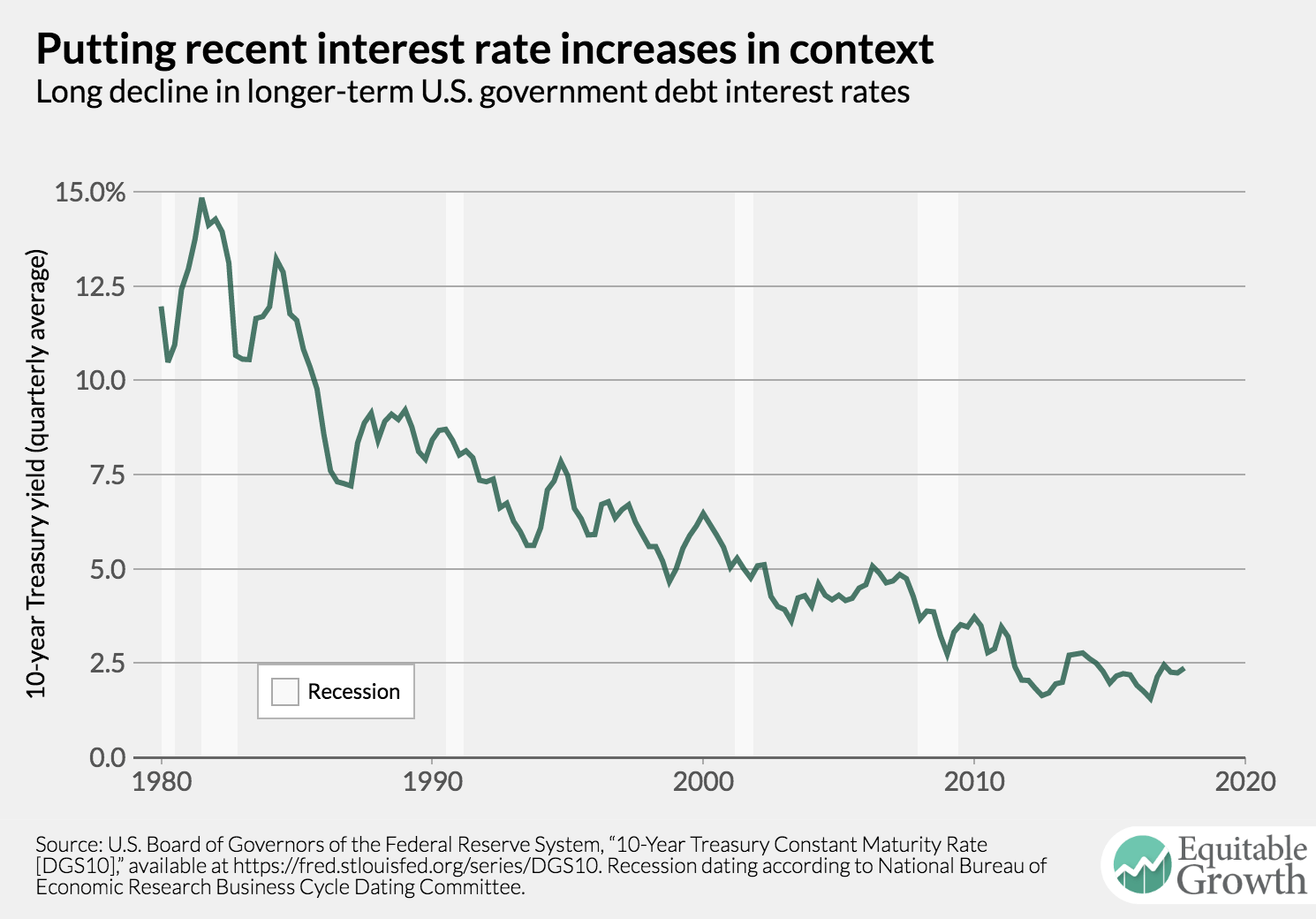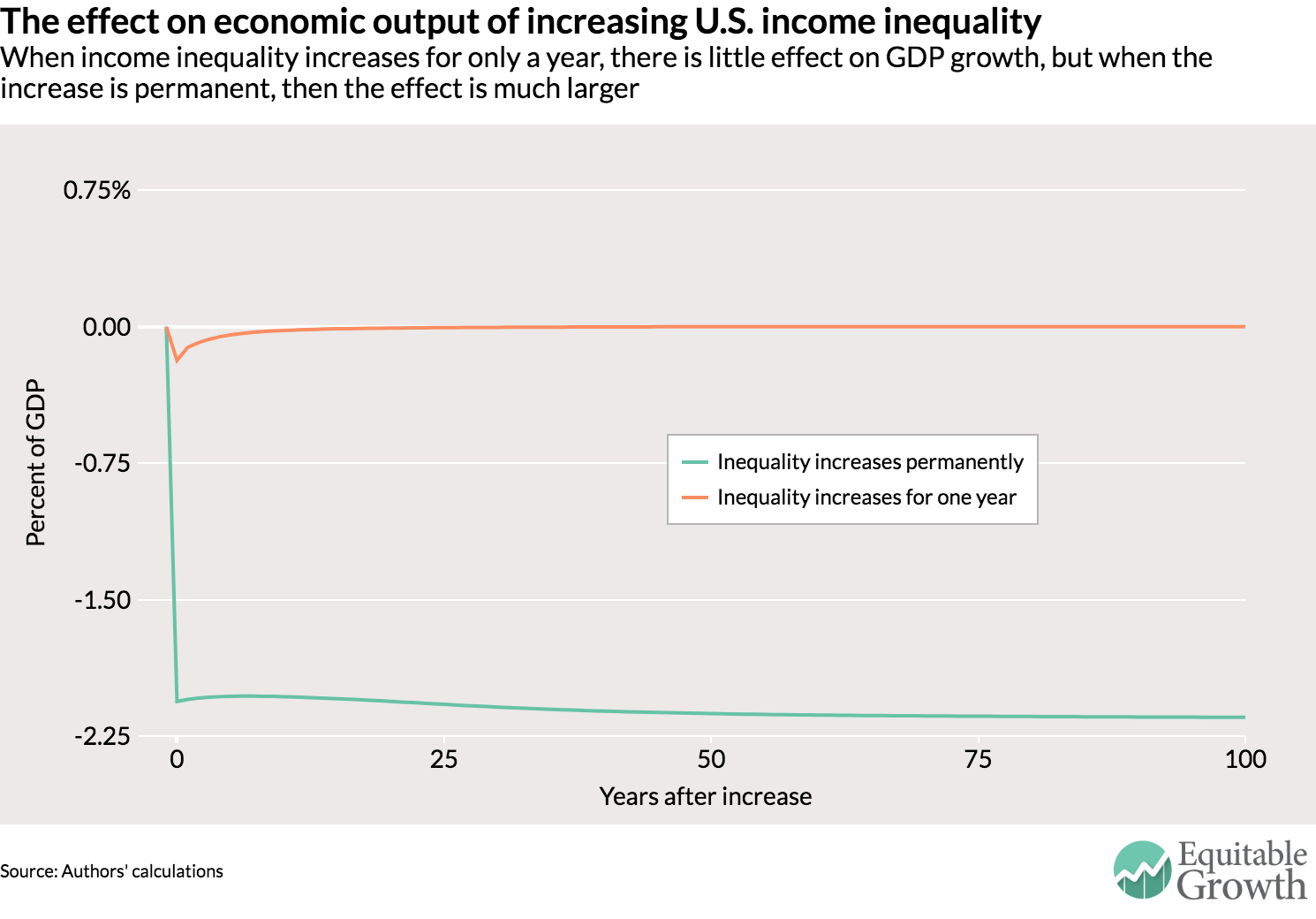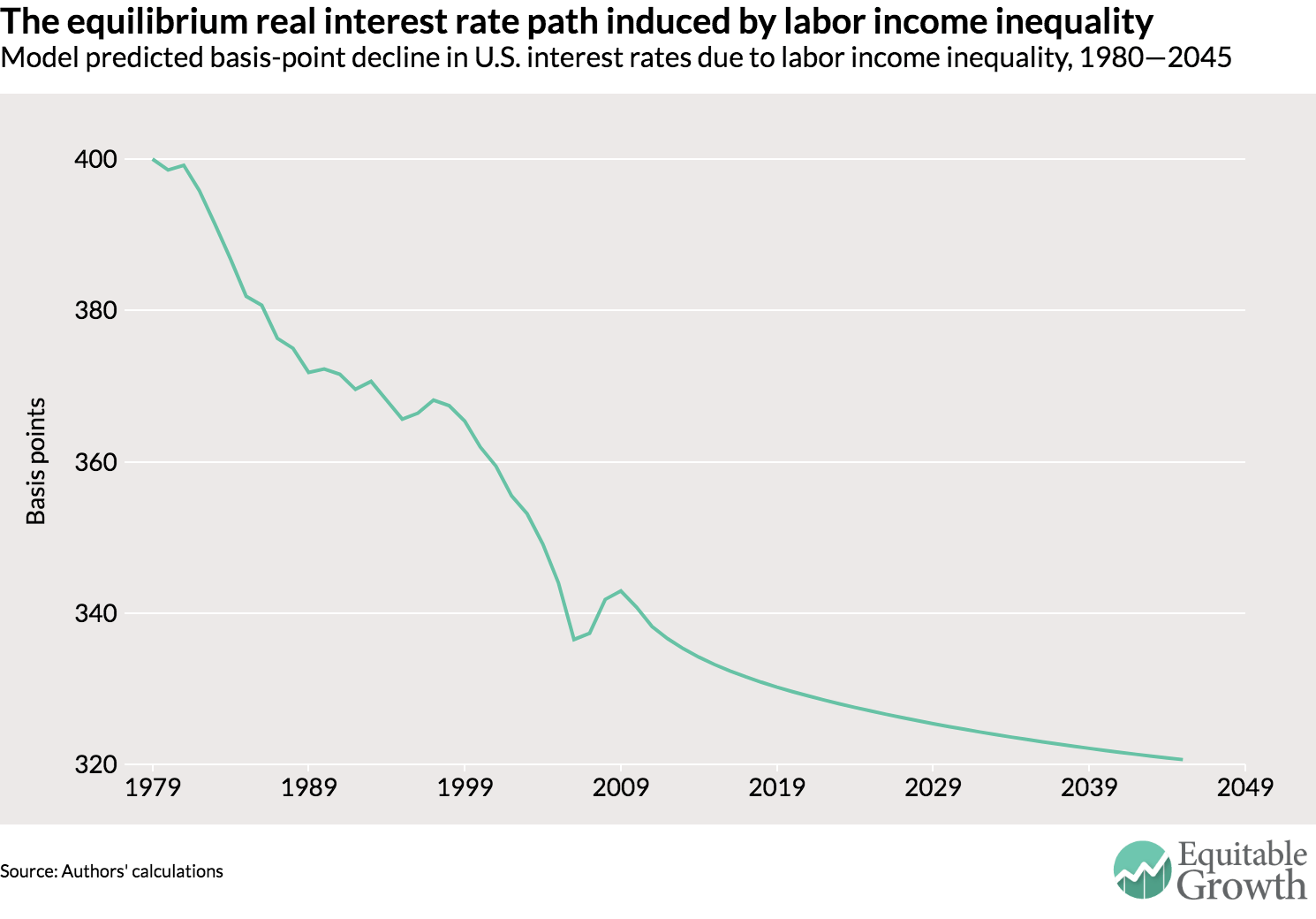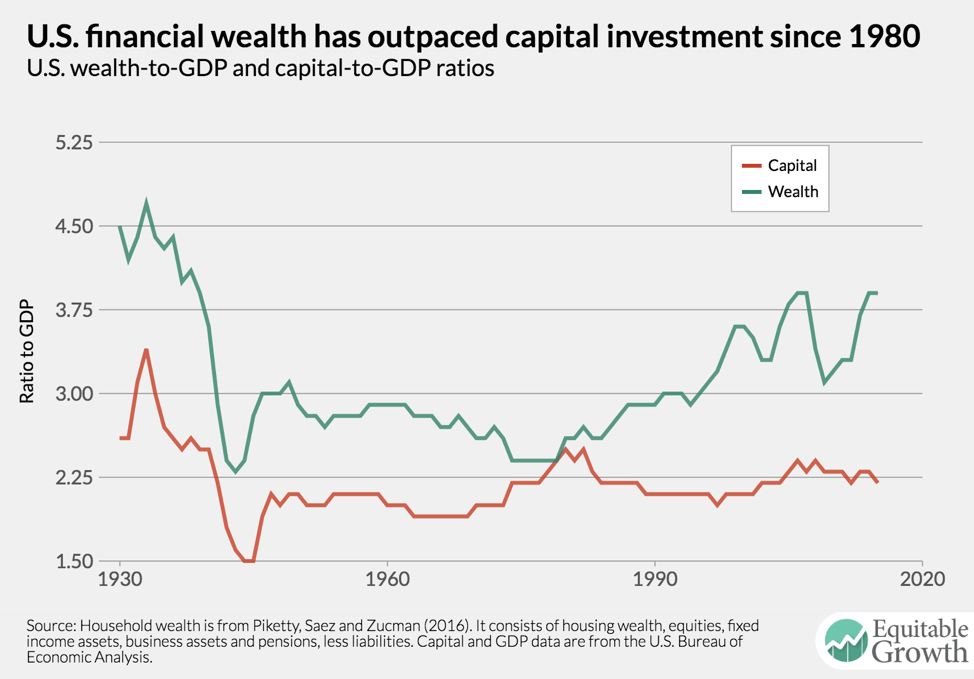Must-Read: It has been a while since I noted how superb Mark Thoma’s Economist’s View has been and continues to be as the indispensable link clearinghouse on useful and interesting things in economics. It is still true: Mark Thoma: Economist’s View: Links for 02-19-18
Should-Read: Henry Farrell: The father of consumer sovereignty
Should-Read: Henry Farrell: The father of consumer sovereignty: “[Even] the mainstream of Mont Pelerin was… problematic on apartheid…
…William H. Hutt was at the heart of the problem. Hutt indeed condemned racism, and claimed that it was rooted in opposition to the market. Yet his condemnation only went so far. As Slobodian describes it….
The political complement to [Hutt’s] workplace liberation was not equality for blacks but their second-class status… What he described as “the most vital point of my whole thesis” in The Economics of the Color Bar was not an economic but a political argument: a warning about the “tyranny of parliamentary majorities” under systems of universal suffrage. The fact that blacks were the majority population in South Africa made the situation exceptionally perilous.… Hutt expressed the need “to protect the minorities [that is, Whites] from spoliation and revenge” and suggested that the franchise be adjusted on “some principle of weighting.”… Hutt did foresee the gradual introduction of more equality in some “very distant future (it would be very optimistic to assume 50 years).”…
These… subtleties… in Hutt’s position appear either to have escaped the libertarian critics of MacLean who championed, or to have seemed to them for some reason or another not to have been worth mentioning. But they do point up the… elective affinity between certain forms of libertarianism and racism…. In Hutt we have a libertarian economist who is currently being held forward by libertarians as an exemplar of market based anti-racism. Hutt’s actual position was that racism was bad, but the introduction of actual democracy to South Africa was bad too, since it would lead to expropriation. Hence, Hutt’s solution of a weighted franchise, and Hayek’s apparent suggestion that the South African state ought be limited to a minimal body designed to enforce contracts, protect market competition and no more, lest a democratic majority seize upon it as a tool for redistribution. For sure, neither Hutt nor Hayek appear to have been racist as Röpke was, or direct supporters of the version of apartheid that then applied. But weighting the vote or crippling the state for fear of a black majority is weighting the vote or crippling the state for fear of a black majority, whichever way you slice it.
Should-Read: Bridget Ansel: The gender gap in economics has ramifications far beyond the ivory tower
Should-Read: What you see depends on where you look from. I would not say that economics has covered itself with glory in taking a true 360-degree view of the situation. And Bridget has put her finger on one reason why: Bridget Ansel: The gender gap in economics has ramifications far beyond the ivory tower: “Given the extent to which every individual’s life is intertwined with the economy…
…the need to increase diversity in economics is not just about fairness or productivity within the ivory tower. It affects whether and how the needs of everyone—and not just certain groups—are reflected in our understanding of the economy and accounted for in our national policies…
How income inequality may affect U.S. interest rates

Long-term U.S. interest rates have been rising this year, with the yield on a 10-year Treasury bond increasing about half a percentage point since the beginning of the year. The rise in the yield over just the past few months may seem large, but looking at a longer time horizon since the early 1980s shows that the yield trend has been downward. (See Figure 1.) Is the recent uptick in 2018 the start of a new upward trend or just a blip in the current downward trajectory? That answer depends in part on what’s caused the long-term decline and whether that trend will continue. New research points at an important contributor to the decline in interest rates that may continue on for some time without policy changes: the high level of income inequality in the United States.
Figure 1

Recently released as part of the Equitable Growth Working Paper Series, a paper by Adrien Auclert of Stanford University and Matthew Rognlie of Northwestern University looks at how income inequality affects the amount of demand in the economy. Most people’s thinking about inequality’s impact on demand is through consumption, but that’s only one factor that economists need to consider. Higher levels of income inequality might reduce household consumption, but then other markets in the economy are going to adjust. Business investment (another piece of aggregate demand) is going to adjust after consumption declines, for example, and then, of course, there’s the reaction of policymakers in the form of monetary or fiscal policy.
Auclert and Rognlie work to show how income inequality affects or determines changes in demand through some of these so-called partial equilibrium effects and then how they are transmitted into general equilibrium-the equilibrium when all the markets in an economy clear. The two authors show that the processes are different depending upon the timeframe that the model is looking at.
In the short run, the key to understanding partial equilibrium is the relationship (or covariance) between income and the marginal propensity to consume. Understanding how much individuals will respond to a one-time shock to their income gives us the partial equilibrium response of consumption. Then this partial effect gets multiplied by the general equilibrium effects, which are determined by monetary policy, fiscal policy, and how much incomes will respond to the decline in employment during an economic downturn. What the authors find is that, in the short run, a rise in income inequality only slightly affects demand in the economy.
In the long run, however, the source of higher income inequality matters tremendously. If higher income inequality is due to higher income risks, or more volatile incomes, then that reduces demand in the economy quite a bit. That’s because the partial equilibrium effects related to consumption are driven by how much the demand for assets will increase depending upon changes to income risk. Essentially, if rich people are rich because they have more variable incomes, then they will have more of a demand for assets to use as precautionary savings. Increased demand for assets means reduced demand for current goods and services, which reduces overall aggregate demand.
The key here for the partial equilibrium effect in the long run is the sensitivity of asset demand to “idiosyncratic income risk.” If people are more likely to demand assets (save more money) for a given amount of risk, then higher income inequality will result in more saving and reduced demand. The general equilibrium multiplier here is similar to the one for the short run.
Using this long-run model, Auclert and Rognlie can give an estimate of how of the decline in the natural, or equilibrium, rate of interest can be explained by higher income inequality. If the increase in income inequality is because of higher income risk, then inequality is responsible for about 20 percent of the total 4 percentage point decline in interest rates since the 1980s. That leaves almost 80 percent of the decline to be explained by other factors, though other research finds important roles for factors that are unlikely to change quickly such as an aging population.
U.S. interest rates may be on the rise, but it’s not clear how long their ascent will last. The past 35 years have seen a significant increase in income inequality, an aging population, and a potentially large increase in some businesses’ monopoly power in the economy alongside other structural shifts that change the functioning of the economy. Until we see significant changes in those factors and others, interest rates don’t seem likely to rapidly ascend anytime soon.
Income inequality and aggregate demand in the United States

Income inequality has been rising for decades in the United States. While there are many reasons why this trend may be concerning, one particular worry for economists and policymakers is the effect that it might have on macroeconomic activity through what is sometimes called the aggregate demand channel. The argument is as follows: There is some evidence that the rich save more than the poor. A rise in income inequality implies more income accruing to the rich, a trend that may be depressing overall consumption and in turn lowering aggregate output and employment.
A competing argument, however, focuses on the resulting increase in savings, which could be expected to translate into an increase in investment, raising the capital stock and economic output in the future. In this view, higher income inequality creates some losers, but it leads to an increase in aggregate Gross Domestic Product. Whether the first or the second effect dominates depends on what macroeconomists call general equilibrium considerations, and in particular, on our presumptions about the response of monetary policy to rising income inequality. This column examines those two effects, based on our newly released working paper.
A model of the effect of income inequality on aggregate demand
Before turning to that analysis, let us first briefly establish the basis of our inquiry-rising income inequality. Two common measures of inequality in the United States are the standard deviation of log earnings (a measure of inequality within labor income) and the capital share (a measure of inequality between labor and capital). As has been widely documented, both measures have risen since the 1980s.1 (See Figure 1.)
Figure 1

Up until now, most general equilibrium macroeconomic models that were used to evaluate the effects of rising inequality were built under the assumption that the U.S. Federal Reserve would immediately accommodate increases in income inequality by lowering interest rates. Those models accord with the second view-that inequality leads the Fed to lower the cost of capital, encouraging investment, which can lead to an economic boom. In our paper, we show that if we assume that monetary policy has limited willingness or ability to respond to the rise in inequality, then the outcome for GDP looks more concerning.2 Lower consumption lowers employment and individual incomes, feeding back into even lower consumption. Firms disinvest because they anticipate lower employment in the future, and this lowers incomes even further.
Our new model fits known facts about individuals’ marginal propensities to consume and their saving behavior. We use the model to predict the potential effect of an increase in inequality on economic output, assuming that monetary policy is at the zero lower bound for nominal interest rates, so that it is constrained not to respond to increases in inequality. We show that the key determinant of the effect of inequality on GDP is its effect on asset demand. This is the answer to the question: How much would aggregate wealth increase if we were to artificially hold all other macroeconomic factors such as interest rates and incomes constant? For illustration, we consider two scenarios: one in which inequality rises temporarily-as in the year-to-year fluctuations in the 1990s-and one in which it increases permanently. (See Figure 2.)
Figure 2

In each case, we assume an increase in inequality of four log standard deviation points (the extent to which the light green line in Figure 1 rose since the 2000s). The orange line in Figure 2 shows that if this increase lasts for only a year, then the effect on output is negative but small-less than two-tenths of a percentage point of GDP. The reason is that marginal propensities to consume are negatively correlated with individual incomes, but this correlation is small-a fact that holds not only in our model but also in datasets that have information about individuals’ incomes and marginal propensities to consume. Hence there is a small effect on asset demand, and a small effect on output.
Our more provocative result is the red line in Figure 2-the case of a permanent increase in inequality. There, our model predicts that the level of output could fall permanently by around 2 percentage points as a result. The reason is that inequality causes individuals’ asset demand to rise permanently by a large amount. In our model, this is because inequality leads individuals to face more risk and volatility in their incomes-and that of their offspring-going forward, leading them to increase savings for precautionary and income smoothing purposes.3 In general equilibrium, employment has to fall by a substantial amount to restore equality between the demand and the supply of assets.
Asset demand, asset supply, and equilibrium interest rates
While this is a stark outcome, our new paper suggests ways in which policy can mitigate the effect of income inequality on aggregate demand. The first is fiscal policy, including government spending and budget deficits. In our model, increases in budget deficits help mitigate the fall in economic output because more government debt increases asset supply.
Similarly, monetary policy can respond by lowering interest rates. In fact, the decline in U.S. interest rates that we have observed since the 1980s could have been a response, in part, to rising inequality. Our model predicts what might have been the effect of rising inequality (as in the light green line of Figure 1) on the “equilibrium” or natural interest rate-the interest rate that the Fed needs to set in order to maintain full employment without generating inflation. (See Figure 3.)
Figure 3

Our model suggests a decline of 80 basis points in that equilibrium rate due to rising income inequality, about one-fifth of the 4 percentage point decline documented by Federal Reserve economists Thomas Laubach and John C Williams between 1980 and 2013.4 One implication of our finding is that inequality might have been one of the factors bringing the Fed closer to the zero lower bound of interest rates in the aftermath of the financial crisis beginning in 2008.
Another implication of our demand-supply framework is that of the effect of a rising capital share on equilibrium interest rates and aggregate demand. The dashed red line in Figure 1 shows an increase in that share over the past 30 years. Economists Paul Krugman and Lawrence Summers have argued that this might have contributed to depressing the equilibrium interest rate-or that further increases in market concentration today would be detrimental to aggregate demand.5 In our model, these claims are incorrect. We find that an increase in the capital share always leads to an increase in asset supply because more profits get capitalized into assets that households can trade. This increase in the supply of tradable assets has the exact opposite effect from the increase in asset demand due to higher income inequality: It raises equilibrium interest rates and raises output in liquidity traps.
Policy implications
Our work has a number of important policy implications. First, it suggests that the Federal Reserve and other central banks should keep track of income inequality over time because it influences the decisions that central banks ought to take. Second, our work suggests that not all forms of income inequality have the same effect on equilibrium interest rates: Inequality that raises future risk depresses the natural rate of interest, but technological advances that raise the capital share raise can have the opposite effect. Our model also suggests a more benign view of fiscal deficits than is often assumed in policy discussions because of their beneficial effects on asset supply. A combination of detailed data work narrowing in on the causes of rising income inequality, combined with a model that teases out its aggregate implications, can help the Fed conduct better monetary policy.
Adrien Auclert is an assistant professor of economics at Stanford University and Matthew Rognlie is an assistant professor of economics at Northwestern University. Auclert is a Washington Center for Equitable growth 2015 grantee.
Should-Read: Paul Krugman: Budgets, Bad Faith and ‘Balance’
Should-Read: When I think of the Committee for a Responsible Federal Budget, I think of its Maya MacGuineas telling me in 2009-10 that they had to repeatedly and enthusiastically praise the best-performing deficit-hawk Republican—then Senator Voinovich—in order to keep lines of communication open, and give Republicans incentive to do better. Perhaps it is time for CRFB to make a public acknowledgement that, ex post at least, this strategy was not so smart? That one was not so reality-based in the past is a strong reason to do a frank and open retrospective, if only to keep one from being not so reality-based in the future: Paul Krugman: Budgets, Bad Faith and ‘Balance’: “my anger is… directed at… enablers, the professional centrists, both-sides pundits, and news organizations that spent years refusing to acknowledge that the modern G.O.P. is what it so clearly is…
…Which is not to say that Republicans should be let off the hook. To be sure, American history is full of politicians and parties that pursued what we would now call nefarious ends…. But I can’t think of a previous example of a party that so consistently acted in bad faith—pretending to care about things it didn’t, pretending to serve goals that were the opposite of its actual intentions. You may recall, for example, the grim warnings from leading Republicans about the dangers of budget deficits, with Paul Ryan, the speaker of the House, declaring that our “crushing burden of debt” would create an economic crisis. Then came the opportunity to pass a $1.5 trillion tax cut targeted on the rich, and suddenly all worries about the deficit temporarily disappeared. Now that the tax cut is law, of course, deficit-hawk rhetoric is back….
…You may also recall how Republicans posed as defenders of Medicare, accusing the Obama administration of planning to cut $500 billion from the program to pay for the Affordable Care Act…. Why have Republicans become so overwhelmingly the party of bad faith?… The party’s true agenda, dictated by the interests of a handful of super-wealthy donors, would be very unpopular if the public understood it. So the party must consistently lie about its priorities and intentions…. Yet the gatekeepers of our public discourse spent years being willfully blind to this reality. Take, for example, the Committee for a Responsible Federal Budget, a think tank that, to be fair, can be a useful resource for budget analysis. Still, I can’t forget that back in 2010 the committee gave Paul Ryan—whose fraudulence was obvious from the beginning to anyone who actually read his proposals—an award for fiscal responsibility….
Washington is full of professional centrists, whose public personas are built around a carefully cultivated image of standing above the partisan fray, which means that they can’t admit that while there are dishonest politicians everywhere, one party basically lies about everything….But our job, whether we’re policy analysts or journalists, isn’t to be “balanced”; it’s to tell the truth. And while Democrats are hardly angels, at this point in American history, the truth has a well-known liberal bias…
Should-Read: Daniel Thomas: London life proves hard to give up for Brexit relocations
Should-Read: “Switzerland yoked to Spain” was what one Eurocrat said about England and Wales. Me? I think the City of London should expand its boundaries beyond the Roman walls, and reactivate its Hanseatic agreements with Hamburg and company: Daniel Thomas: London life proves hard to give up for Brexit relocations: “Brexit…. Some of the most important conversations were… but in the kitchens and living rooms of those learning their fates in the first wave of company relocations…
…My Valentine’s Day supper was peppered with too much talk about cutting ties—with my partner’s firm looking to shift staff to Amsterdam. And I’m not the only one….. This is a crunch month for many, especially among the US financial groups that have less capacity in Europe and so have to make plans earlier. The debate has moved out of the boardrooms to the HR departments…. This week, a French financial services lobbyist said up to 4,000 jobs were expected to move to Paris—lured by Emmanuel Macron’s charm offensive and tax exemptions—while Frankfurt now expects up to 1,000 this year. European school intakes are a good gauge. International schools in Frankfurt and Paris are among those expanding while Goldman Sachs has reserved 80 schools places in Frankfurt. Bankers suggest up to 1,000 places are being sought at international schools by financial services groups in Germany alone….
One banker—on the list to move to Paris because he speaks French—says moving from London will be made easier by issues such as local tax and politics as well as the culture and access to the mountains for skiing…. There is also a new tribe being set up of Europe-trotting business people—the 5:2ers with families and homes in Britain who live for the working week out of a suitcase. They are pricing the commute on the Eurostar and into City airport (and talking with spouses about how much they need to be around). One banker says that his francophone members of staff had initially been excited about the prospect of cuts to personal income tax rates. But enthusiasm quickly cooled, he adds, when his “Eurotrash” colleagues discovered they could be moving to Dublin, and even further from their beloved beaches and ski slopes…
Should-Read: Doug Campbell: Relative Prices, Hysteresis, and the Decline of American Manufacturing
Should-Read: Another good paper on the costs of a strong dollar policy. It is one thing if (as in the 1990s) the strong dollar and the consequent downward pressure on (some) tradable manufacturing is a result of high investment spending in the United States. In those cases the bad effects are cushioned by higher productivity in nontradeables and in sectors of emerging comparative advantage. It is quite another if the decline in investment and manufacturing spring from increased deficits. No, this is not the fiscal expansion we were waiting for: Doug Campbell: Relative Prices, Hysteresis, and the Decline of American Manufacturing: “This study uses new measures of real exchange rates to study the collapse of US manufacturing employment in the early 2000s in historical and international perspective…
…To identify a causal impact of RER movements on manufacturing, I compare the US experience in the early 2000s to the 1980s, when large fiscal deficits led to a sharp appreciation of the dollar, and to Canada’s experience in the mid-2000s, when high oil prices and a falling US dollar led to an equally sharp appreciation of the Canadian dollar. Using disaggregated sectoral data and a difference-in-difference methodology, I find that a temporary appreciation in relative unit labor costs for the US leads to persistent declines in employment, output, and productivity in relatively more open manufacturing sectors. The appreciation of US relative unit labor costs can plausibly explain more than two-thirds of the decline in manufacturing employment in the early 2000s…
Weekend reading: “changing roles” edition
This is a weekly post we publish on Fridays with links to articles that touch on economic inequality and growth. The first section is a round-up of what Equitable Growth published this week and the second is the work we’re highlighting from elsewhere. We won’t be the first to share these articles, but we hope by taking a look back at the whole week, we can put them in context.
Equitable Growth round-up
This week’s release in Equitable Growth’s Working Paper Series argues that an increase in monopoly power, together with a decline in interest rates, is the answer to five “puzzles” that have emerged in U.S. economic data over the past 40 years. The five closely related trends include the outpacing of capital investment by financial wealth, and the simultaneous decline of the labor share of income and increase in the share of income going to profits.
Equitable Growth’s Junior Fellow Jacob Robbins, a co-author of the paper, broke down the five puzzles and the paper’s key findings in a Value Added for us. You can also read coverage of the working paper by the New York Times’ Eduardo Porter and Bloomberg BusinessWeek’s Peter Coy.
Links from around the web
Despite the improving economy, workers haven’t seen much of a pick-up in their wages. One reason might be changes in firms’ compensation practices, as the concern with staying flexible in a changing global labor market has caused more employers to give one-time bonuses rather than pay increases. [nyt]
Workers who are employees of a company – rather than independent contractors – get many benefits for which contractors are ineligible, from their employer picking up the majority of health insurance premiums to eligibility for unemployment insurance if they lose their job and workers compensation if injured on the job. However, the share of workers who are characterized as independent contractors rather than employees has been growing faster than any other type of worker as employers look to shed the cost of traditional responsibilities to employees. That trend could be accelerated by last year’s tax bill, which allows independent contractors to write off 20 percent of their business income – but the benefits of the tax bill might not be enough to balance out the loss of employee benefits for these workers. [cnbc]
Senator Marco Rubio (R-FL) and Ivanka Trump are working together on a plan to increase access to parental leave by allowing families to draw from their Social Security retirement benefits to pay for it. However, experts from across the political spectrum are expressing concern that this plan is poorly designed, will not address the full range of families’ care needs, and will put future retirement at risk. [business insider]
Read what the research tells us about the best ways to structure paid leave in this report by Equitable Growth’s Bridget Ansel and Heather Boushey.
Over the past eight years, debates about how to balance spending with deficit concerns have usually pit Democrats arguing for more spending against Republicans voicing concerns about the deficit. Now, with the $1.5 trillion tax bill passed in December and last week’s budget deal to raise spending caps, those roles have been reversed…kind of. [nyt]
Friday figure

Figure from “How the rise of market power in the United States may explain some macroeconomic puzzles” by Jacob Robbins
Should-Read: Martin Wolf: Brexit has replaced the UK’s stiff upper lip with quivering rage
Should-Read: Martin Wolf: Brexit has replaced the UK’s stiff upper lip with quivering rage: “In part, the UK is victim of its past successes…
…A small offshore island became, temporarily, a superpower… defined… against Europe and… any power wishing to dominate Europe…. Now, Europe is uniting while the UK is very much not a superpower. So what does it choose? Is it to be an irrelevant offshore island or a part of a united Europe? The choice has to be divisive. When divisions are so deep, nobody is considered neutral….
How will this end? The answer is that anything is possible. Could there still be a “no-deal Brexit”? Yes. Could there be another referendum? Yes. But the likelihood is that the UK will exit on terms laid down, in detail, by the EU. When a country is this divided and its political processes are in such disarray, someone else has to sort things out. The EU will do so, because that is in its interests. The EU will not let the UK have its cake and eat it. It is led by people who also have a historical goal: not to return to the past. Their history was not British history and their aims are not British aims. They will determine the terms of the separation. We will then see whether the UK’s civil war is resolved, or renewed in other, yet more bitter, ways.

